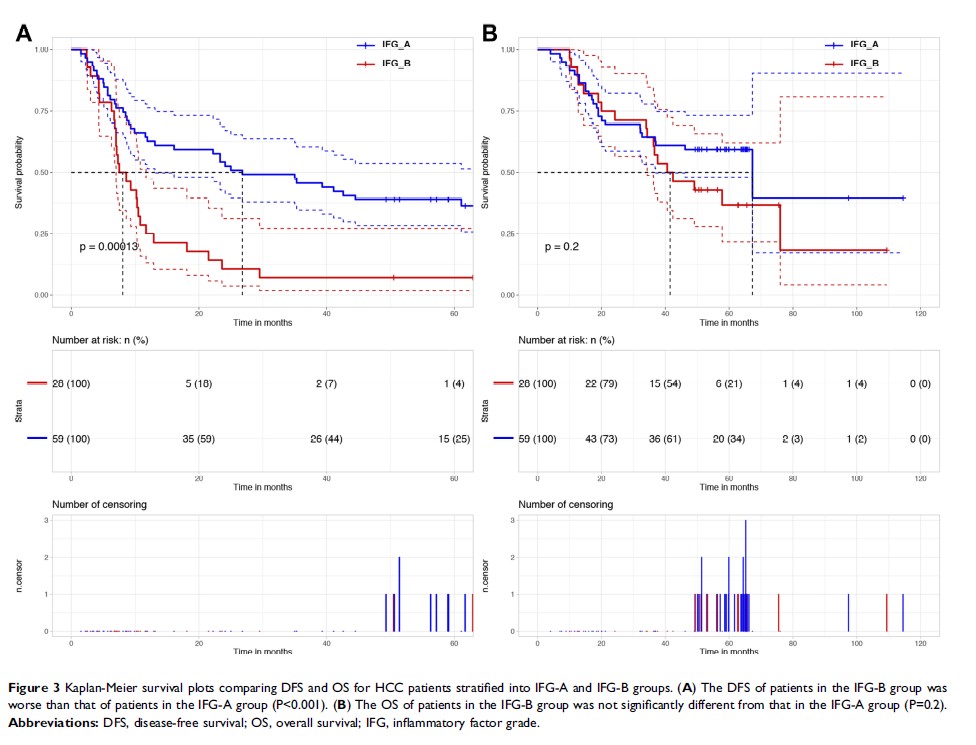9 1 2 3 6
论文已发表
注册即可获取德孚的最新动态
IF 收录期刊
- 2.6 Breast Cancer (Dove Med Press)
- 3.9 Clin Epidemiol
- 3.3 Cancer Manag Res
- 3.9 Infect Drug Resist
- 3.6 Clin Interv Aging
- 4.8 Drug Des Dev Ther
- 2.8 Int J Chronic Obstr
- 8.0 Int J Nanomed
- 2.3 Int J Women's Health
- 3.2 Neuropsych Dis Treat
- 4.0 OncoTargets Ther
- 2.2 Patient Prefer Adher
- 2.8 Ther Clin Risk Manag
- 2.7 J Pain Res
- 3.3 Diabet Metab Synd Ob
- 4.3 Psychol Res Behav Ma
- 3.4 Nat Sci Sleep
- 1.9 Pharmgenomics Pers Med
- 3.5 Risk Manag Healthc Policy
- 4.5 J Inflamm Res
- 2.3 Int J Gen Med
- 4.1 J Hepatocell Carcinoma
- 3.2 J Asthma Allergy
- 2.3 Clin Cosmet Investig Dermatol
- 3.3 J Multidiscip Healthc

较高的炎症因子分级可预测 I-II 期(AJCC 癌症分期)肝细胞癌患者 R0 切除术后较低的无病生存率
Authors Zhang M, Chua MS, Hu J, Li H, Zhang S, Wu L, Han B
Received 9 September 2019
Accepted for publication 26 November 2019
Published 19 December 2019 Volume 2019:11 Pages 10623—10632
DOI https://doi.org/10.2147/CMAR.S230386
Checked for plagiarism Yes
Review by Single-blind
Peer reviewer comments 2
Editor who approved publication: Dr Sanjeev Srivastava
Purpose: In this study, we established the inflammatory factor grade system (IFGs) based on the hepatocellular carcinoma (HCC) microenvironment to investigate the role of inflammatory factor grade (IFG) in predicting the prognosis of patients with American Joint Committee on Cancer (AJCC) stage I-II.
Patients and methods: We enrolled 87 HCC patients with AJCC stage I-II who underwent R0 resection between 2000 and 2012 and had paraffin-embedded specimens. Immunohistochemistry (IHC) was performed to investigate the expression of 12 inflammatory factors and then to establish the IFGs (grade A or B) based on the IHC data. Subsequently, Kaplan-Meier and Cox univariate/multivariate survival analyses were performed to examine the potential prognostic significance.
Results: Higher IFG (IFG-B) is significantly associated with greater tumor size (P=0.037), and IFG-B predicts a worse disease-free survival (DFS, P<0.001). Moreover, a platelet count (PLT) ≤100×109/L, tumor size ≥5 cm, poor tumor differentiation, and IFG-B are independent risk factors for DFS.
Conclusion: Overall, by establishing a grading system for the level of inflammatory factors in the HCC microenvironment, IFG-B can effectively predict poor DFS in AJCC stage I-II HCC patients after R0 resection.
Keywords: hepatocellular carcinoma, recurrence, prognosis, inflammation
